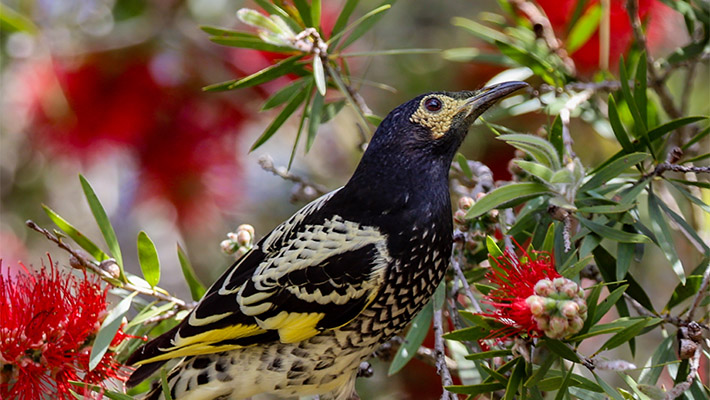Posted on 18th September 2024 by Media Relations
49 Regent Honeyeaters released in Hunter Valley
In a significant step towards the conservation of one of Australia’s most critically endangered birds, 49 zoo-bred Regent Honeyeaters have been released into the wild on Wonnarua country in the lower Hunter Valley.
Regent Honeyeaters are a unique species of songbird found only in south-eastern Australia and are known for their striking black-and-yellow ‘embroidery’ markings. Once abundant from Queensland to South Australia, their numbers have dwindled to just 250 to 300 birds in the wild.
The 2024 NSW Regent Honeyeater release is the third large-scale release on Mindaribba Local Aboriginal Land Council land, and the fifth release state-wide, as part of a national effort to save the species.

The latest release on Wonnarua Country involved the Mindaribba Local Aboriginal Land Council, Taronga Conservation Society Australia, BirdLife Australia and Local Land Services.
This work is led by the NSW Government’s Saving our Species program which has provided more than $1 million as part of the National Regent Honeyeater Recovery Plan, with additional support from NSW National Parks and Wildlife Service and the Australian National University.
More than 200 zoo-bred Regent Honeyeaters have now been released in NSW.
Members of the public can contribute to ongoing efforts to track the survival and movements of the Regent Honeyeater by reporting sightings to BirdLife Australia
“This latest release of nearly 50 Regent Honeyeaters bred at Taronga Zoo is an exciting step forward in the NSW Government’s plan to save this critically endangered species.
“NSW is home to creatures and plants that live nowhere else on this planet. The Minns Labor Government is taking action to ensure they exist here, for generations and centuries to come.
"I’d like to thank the Mindaribba Local Aboriginal Land Council, who have generously made their land available for the third time, helping us give this beautiful bird every chance of survival.”
Minister for the Environment Penny Sharpe